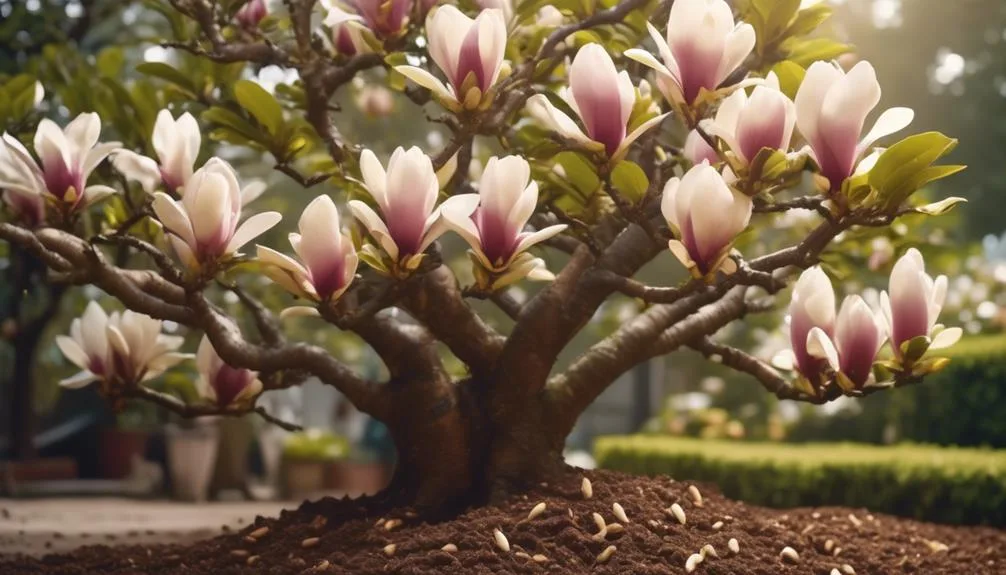Caring for magnolia trees is crucial for a fruitful outcome. Organic fertilizers play a vital role in providing essential nutrients and enhancing soil health. With various options available, finding the right one can be tricky.
This article outlines the different types of organic fertilizers, their application, and the best choices tailored for magnolia trees. Stay tuned to discover the most suitable organic fertilizers to ensure the well-being of your magnolia trees.
Benefits of Organic Fertilizers
Organic fertilizers offer a natural and sustainable way to nourish your magnolia trees, promoting healthy growth and vibrant blooms without the use of harsh chemicals. These fertilizers improve soil health by promoting beneficial microbial activity, which in turn aids in nutrient absorption for your magnolia trees.
Unlike synthetic fertilizers, organic options have a minimal environmental impact, making them a sustainable choice for your gardening needs. By utilizing organic fertilizers, you contribute to sustainable gardening practices that benefit the environment.
These fertilizers provide a balanced and slow release of essential nutrients, ensuring that your magnolia trees receive the nourishment they need over an extended period.
Types of Organic Fertilizers
Enhance the health and vibrancy of your magnolia trees with a diverse range of natural fertilizers that nourish the soil and promote optimal growth.
Composting benefits magnolia trees by providing rich, organic matter that improves soil structure, fertility, and moisture retention.
One effective type of organic fertilizer is compost, which can be made from kitchen scraps, yard waste, and other organic materials.
Another natural alternative is fish emulsion, a nutrient-rich liquid fertilizer made from fish byproducts. It provides a quick source of nutrients for magnolia trees and enhances soil fertility.
Additionally, seaweed-based fertilizers are rich in trace minerals and growth hormones, promoting healthy growth and blooming.
These natural fertilizers offer a sustainable and environmentally friendly way to nourish your magnolia trees and support their long-term health.
Application of Organic Fertilizers
To effectively apply organic fertilizers to your magnolia trees, ensure that you distribute the fertilizer evenly across the root zone for maximum absorption by the soil and roots.
Here are some tips for applying organic fertilizers to your magnolia trees:
- Use a hand trowel or rake to gently work the organic fertilizer into the top layer of soil around the base of the tree.
- Water the area thoroughly after application to help the natural ingredients in the fertilizer seep into the soil and reach the roots.
- Avoid piling the organic fertilizer directly against the trunk of the magnolia tree to prevent potential damage.
- Consider the environmental impact of the organic fertilizer you choose, opting for products that are sustainably sourced and have minimal environmental impact.
Best Organic Fertilizers for Magnolia Trees
When selecting fertilizers for your magnolia trees, consider using composted manure to provide essential nutrients and improve soil health. Composted manure is a fantastic organic fertilizer that enriches the soil with essential nutrients, promotes beneficial microbial activity, and enhances nutrient absorption by the magnolia tree roots.
Another excellent organic fertilizer for magnolia trees is fish emulsion, which is high in nitrogen and provides a quick nutrient boost.
Additionally, seaweed-based fertilizers are rich in micronutrients and help stimulate soil amendments, promoting overall tree health.
Utilizing these organic fertilizers not only nourishes your magnolia trees but also supports the soil's ecosystem, ensuring that your trees receive the necessary nutrients for healthy growth and vibrant blooms.
Tips for Using Organic Fertilizers
Considering the importance of properly utilizing organic fertilizers for your magnolia trees, here are some practical tips to ensure their effective application and maximum benefit for your trees' health and growth.
- Composting basics: Start composting to create your own nutrient-rich organic fertilizer. Use kitchen scraps, yard waste, and other organic materials to create compost that will enrich the soil and promote the overall health of your magnolia trees.
- Soil health: Understand the specific soil needs of your magnolia trees. Conduct soil tests to determine the pH levels and nutrient deficiencies, and then choose organic fertilizers that address these specific requirements.
- Proper application: Follow the instructions on the organic fertilizer packaging for the correct application rates and timing. Apply the organic fertilizer evenly around the base of the magnolia trees to ensure that the roots receive the necessary nutrients.
- Regular maintenance: Incorporate organic fertilizers into your regular maintenance routine to support the long-term health and vitality of your magnolia trees.
Conclusion
Incorporating organic fertilizers like compost, fish emulsion, and bone meal is key to nurturing thriving magnolia trees.
Their natural, slow-release nutrients benefit both the soil and the trees, ensuring long-term, beautiful blooms.
Consider the lasting impact of choosing organic options for the health and vibrancy of your garden.
Happy gardening!

My interest in trees started when I first saw the giant sequoias in Yosemite.
I was a teenager then, and I remember thinking, “I need to learn more about this.”
That moment stuck with me.
A few years later, I went on to study forestry at Michigan Tech.
Since graduating, I’ve worked in a mix of hands-on tree care and community education.
I’ve spent over ten years helping people understand how to plant, maintain, and protect the trees in their neighborhoods.
I don’t see trees as just part of the landscape.
They are living things that make a real difference in our daily lives.
